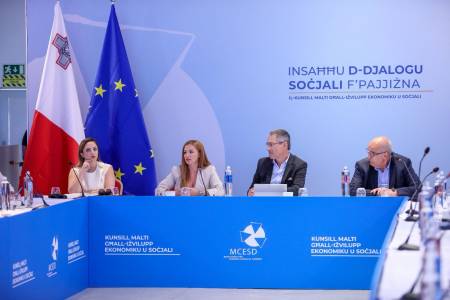The Malta Council for Economic and Social Development (MCESD) discussed the drafting of the National Climate Adaptation Plan. This came just a few days after the publication of a Preliminary Market Consultation (PMC) aimed at engaging experts in the development of the National Climate Plan currently being prepared by the Climate Action Authority.
The Minister for the Environment, Energy and Public Cleansing, Miriam Dalli, stressed that it is significant that the MCESD has begun discussing this plan at such an early stage of its formulation. “This is a global challenge, and Malta, as a small island, must adapt to it. We cannot do this without the involvement of society as a whole. That is why, from the very beginning, we consciously came before the MCESD so that this Council would be part of the plan’s formulation. Faced with a challenge that even requires changes in the way we think and do things, we must act as a team, pulling in the same direction,” said Minister Dalli.
In the presence of MCESD Chairman Perit David Xuereb, technical presentations were also delivered by the CEO of the Climate Action Authority, Ing. Abigail Cutajar, and consultants Grant Thornton, represented by Dr George Vella.
Minister Dalli elaborated further on the importance of this plan and the Maltese Government’s strategy in this regard. “We have given a mandate to the Climate Action Authority to develop a national plan that strengthens our resilience. We need to minimise risks and ensure resilience before the effects become more severe and more costly to remedy,” said Minister Dalli, who underlined the need to build a resilient country by planning strategically ahead to secure a good quality of life for all citizens. “What we are drafting today is another important step by a serious and mature country, one that does not wait for problems to arrive but looks ahead and plans for the long term,” added Dr Dalli, noting that there are also many opportunities to improve practices and standards, which Malta should be ready to seize.
During the discussion, social partners emphasised the need for practical and implementable strategies, while also raising issues related to competitiveness, compliance costs, and access to data. Other key themes included education, enforcement, innovation, inter-ministerial coordination, and the involvement of the private sector.
MCESD Chairperson David Xuereb highlighted that Malta’s vulnerability to climate change requires a plan that addresses not only environmental challenges but also the necessary shifts in skills, the impact on businesses, and the investment opportunities in emerging sectors. He thanked all participants for their valuable contributions and reaffirmed the Council’s role in shaping a resilient and inclusive climate strategy.
Climate Action Authority (CAA) CEO Ing. Abigail Cutajar, spoke about how, as the first authority of its kind in the European Union, the CAA is in a strong position to draft and coordinate climate change work. “I always maintained that the setting up of the Authority was only the first step, to be followed by many initiatives. The adaptation plan we are discussing today is one of them, which is why we immediately launched work on it. We have a clear vision of the methodology we want to adopt, and in recent weeks we took the first step by issuing an expression of interest for experts to contribute to this plan. When we speak about an adaptation plan, we are talking about how we live every day. It is not just a matter of reports and technical documents, but actual work on where and how we live. That is why such a plan cannot succeed without the involvement of social partners,” said Cutajar, explaining that there are also various opportunities aligned with the 2050 vision that Malta is shaping.
The social partners expressed a clear commitment to continue contributing actively and constructively so that the Adaptation Plan will be sustainable and relevant to the challenges and potential of the country.
Photo: MEEC/OPM_PS
![]()








